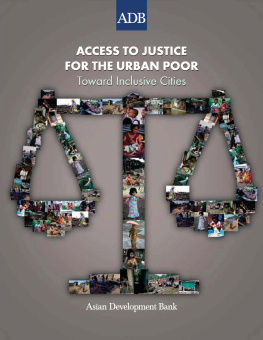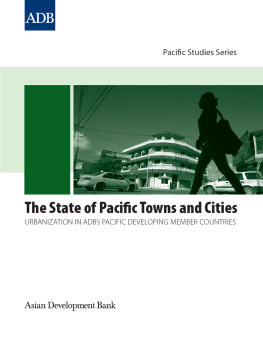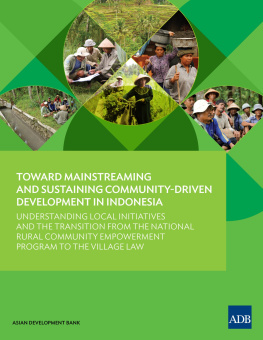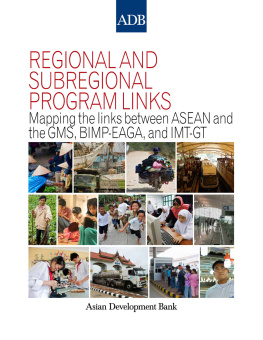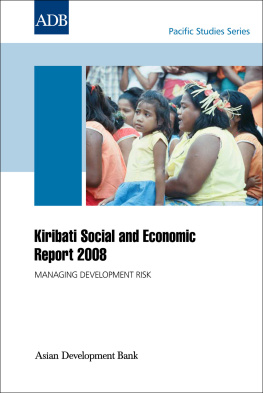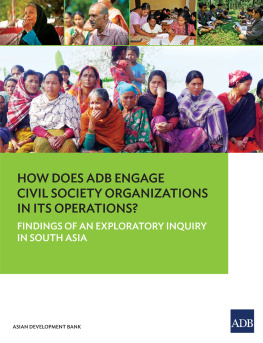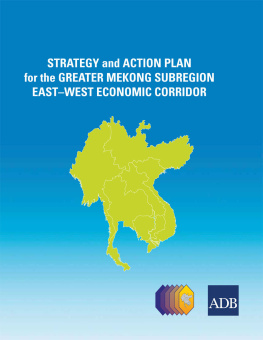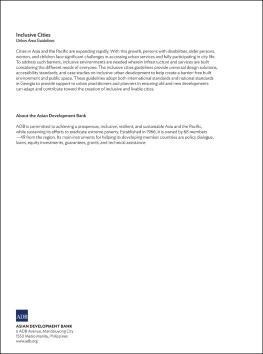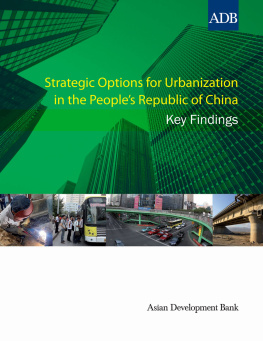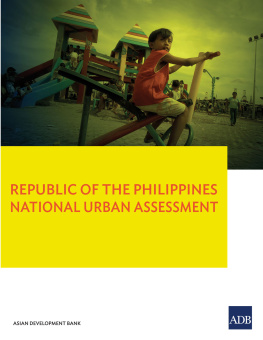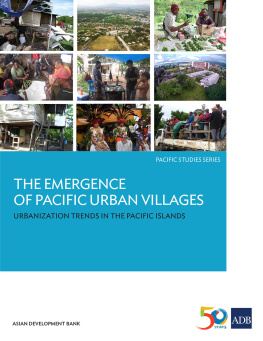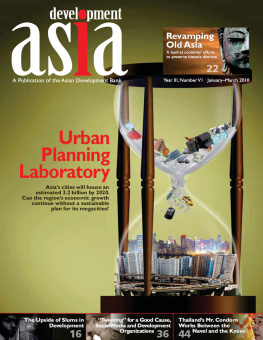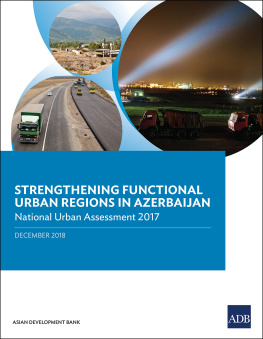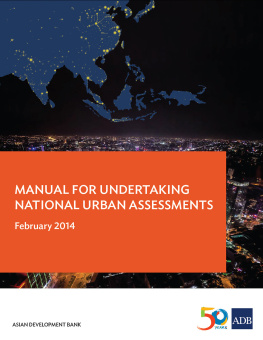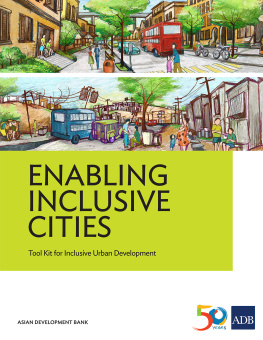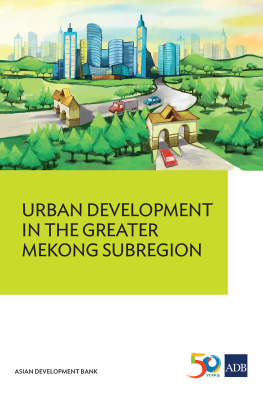ACCESS TO JUSTICE FOR THE URBAN POOR
Toward Inclusive Cities
Asian Development Bank
2010 Asian Development Bank
All rights reserved. Published 2010.
Printed in the Philippines
ISBN 978-92-9092-044-1
Publication Stock No. RPT101888
Cataloging-In-Publication Data
Access to justice for the urban poor: toward inclusive cities Mandaluyong City, Philippines: Asian Development Bank, 2010.
1. Access to justice. 2. Urban poor. I. Asian Development Bank.
The views expressed in this publication are those of the authors and do not necessarily reflect the views and policies of the Asian Development Bank (ADB) or its Board of Governors or the governments they represent.
ADB does not guarantee the accuracy of the data included in this publication and accepts no responsibility for any consequence of their use.
By making any designation of or reference to a particular territory or geographic area, or by using the term country in this document, ADB does not intend to make any judgments as to the legal or other status of any territory or area.
ADB encourages printing or copying information exclusively for personal and noncommercial use with proper acknowledgment of ADB. Users are restricted from reselling, redistributing, or creating derivative works for commercial purposes without the express, written consent of ADB.
Note:
In this report, $ refers to US dollars.
Asian Development Bank
6 ADB Avenue, Mandaluyong City
1550 Metro Manila, Philippines
Tel +63 2 632 4444
Fax +63 2 636 2444
www.adb.org
For orders, please contact:
Department of External Relations
Fax +63 2 636 2648
Contents
Acknowledgments |
Abbreviations |
Currency Conversion Rate |
Glossary |
Foreword |
Executive Summary |
Urban Service Delivery Failure and the Urban Poor |
Why Informal, Self-Help Solutions Ultimately Fail to Benefit the Poor |
The Way Forward: Toward Inclusive Cities |
Introduction |
Poverty Reduction and Urban Governance |
ADB and Good Governance |
The Elements of Good Governance |
Urban Governance |
The Urban Poor, Governance, and Service Delivery Failure |
Housing and Secure Tenure |
Water and Sanitation |
Solid Waste Management |
Transportation |
Conclusion |
Grievances, Disputes, and the Urban Poor |
Formal Dispute Resolution Mechanisms and the Urban Poor |
Summary |
What Works |
Accountability |
Participation |
Predictability |
Transparency |
The Way Forward: Toward Inclusive Cities |
What We Can Do |
Inclusive Project Design: Examples |
Questions to Ask During the Project Preparation Stage |
Project-focused Complaint Handling Mechanisms |
Phases in the Design and Implementation of Grievance Mechanisms |
Acknowledgments
T his publication, Access to Justice for the Urban Poor: Toward Inclusive Cities, was prepared by ADBs Office of the General Counsel (OGC) with the support of Jeremy Hovland, General Counsel and Philip Daltrop, Deputy General Counsel. It is part of the regional technical assistance (RETA) on Access to Justice for the Urban Poor. Caroline Vandenabeele conceptualized the RETA, and she and Victor You acted as task managers under the supervision of Eveline Fischer, who retired as Deputy General Counsel in 2009.
The publication analyzes case studies and other data that appear in the final report of the RETA on Access to Justice for the Urban Poor prepared by The Asia Foundation (TAF) for ADB, and integrates these findings with input from the participants of the RETAs final regional workshop; ADB policies and strategies; and literature on law and policy reform and urban development. Christine V. Lao, legal consultant, is the main author of this publication. The TAF teamcomprised of Erik Jensen, Debra Ladner, Asha Ghosh, and Michael Lieberman, as well as its country specialists: Ferdous Jahan, Lydia Ruddy, John Taylor, Emma Porio and Sauwalak Kittiprapasprepared the final report from which this publication draws, and patiently conducted in-depth country research and organized several country and regional consultations and workshops.
January Sanchez, legal consultant, provided comments on draft RETA reports, and assisted Caroline and Victor in implementing the RETA. Elenita Cruz-Ramos provided excellent administrative support for this project, while Erwin Salaveria and Margret Tangan provided valuable research assistance.
The preparation of this publication involved discussions with many stakeholders within ADB. Special thanks are owed to Robert May, Karin Oswald, Claudia Buentjen, Amy Leung, Januar Hakim, Florian Steinberg, Tatiana Gallego-Lizon, Masayuki Tachiiri, Wendy Walker, Sekhar Bonu, and Madhumita Gupta.
Abbreviations
ADB | Asian Development Bank |
BJS | Barangay Justice System (Katarungang Pambarangay) |
BNP | Bangladesh Nationalist Party |
CODI | Community Organizations Development Institute |
DSK | Dushtha Shasthya Kendra |
ETESP | Earthquake and Tsunami Emergency Support Project |
HOA | homeowners association |
ICESCR | International Covenant on Economic, Social and Cultural Rights |
MERALCO | Manila Electric Company |
MOA | memorandum of agreement |
NGO | nongovernment organization |
OSPF | Office of the Special Project Facilitator |
PAT | Port Authority of Thailand |
PDB | Power Development Board |
PDIP | Partai Demokrasi Indonesia Perjuangan, (Indonesian Democratic Party of Struggle) |
PIL | public interest litigation |
PNPM | Program Nasional Pemberdayaan Masyarakat Mandiri (National Program on Community Self-Help and Empowerment) |
RETA | regional technical assistance |
TAF | The Asia Foundation |
WASA | Water Supply and Sewerage Authority |

